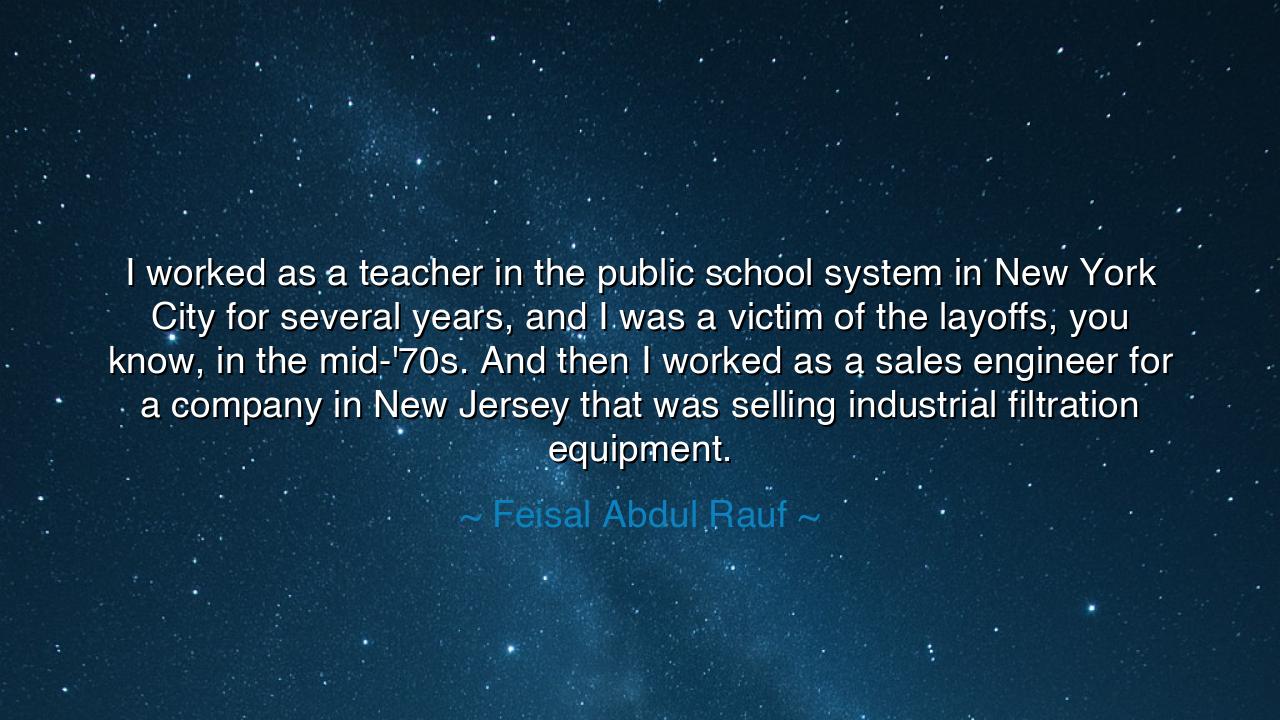
I worked as a teacher in the public school system in New York
I worked as a teacher in the public school system in New York City for several years, and I was a victim of the layoffs, you know, in the mid-'70s. And then I worked as a sales engineer for a company in New Jersey that was selling industrial filtration equipment.






Feisal Abdul Rauf, a man of faith and bridge-building, once recalled with quiet candor: “I worked as a teacher in the public school system in New York City for several years, and I was a victim of the layoffs, you know, in the mid-’70s. And then I worked as a sales engineer for a company in New Jersey that was selling industrial filtration equipment.” At first glance, these words appear as a simple account of employment. Yet hidden within them is a story of resilience, of the shifting tides of life, and of how one must walk with courage through seasons of loss into new paths of growth.
O listener, note first the image of the teacher, standing before students in New York City, shaping minds with patience and labor. This calling is among the noblest, for to teach is to plant seeds in the future, often without ever seeing their bloom. Yet even the most sacred work is not shielded from the blows of circumstance. In the turmoil of the 1970s, when cities struggled with debt and schools were strained, many who had devoted themselves to service were cast aside by the force of layoffs. Here we see the harsh truth: virtue alone does not preserve one from trial. Even the most worthy can taste the bitterness of rejection.
Yet Rauf’s story does not end in despair. From the silence of the empty classroom, he turned to a new and unfamiliar world: that of the sales engineer, working with machines and industry, selling equipment meant to purify and sustain. This shift, from the nurture of human souls to the craft of industrial labor, is a testament to adaptability. The lesson here is ancient—that when one door closes, another may open, and though the work may be different, dignity can be found wherever honest labor is performed.
History abounds with such stories of reinvention. Consider the life of Marcus Aurelius, emperor of Rome, who in times of peace was a philosopher, but in times of turmoil had to don the armor of a general, defending his empire against endless invasions. He would have preferred the quiet of the library, yet he accepted the battlefield with steadfastness. Or think of Nelson Mandela, who from the halls of law was cast into prison for decades, and from there emerged to lead a nation. Like them, Rauf’s path reminds us that greatness is often shaped not by uninterrupted triumph, but by the ability to endure and transform when life’s course is violently changed.
There is another meaning in his words: the purification of struggle. For what is filtration equipment, if not a symbol of what he himself endured? Just as the machine removes impurities from water or air, so too life’s hardships filter the soul, leaving behind what is essential. The loss of his place as a teacher was a fire of purification, stripping away certainty, forcing him to find resilience, humility, and perseverance. In this way, his story reflects the truth that adversity, though painful, may cleanse us of pride and prepare us for greater callings.
The lesson, therefore, is clear: do not despair when you are struck down by forces beyond your control. If you lose your place, seek another. If your role shifts, do not think your worth has diminished. Each season of life may carry you into new labor, but every labor has value if done with integrity. Even a victim of layoffs may rise again, and in rising, may discover new strength, new wisdom, and new purpose.
Therefore, children of tomorrow, take courage. When you face the storms of rejection, remember Rauf’s example: move forward, adapt, and do not lose heart. The work of today may not be the work of yesterday, but it may prepare you for the work of tomorrow. Let every trial be your filtration, leaving you clearer, purer, and stronger. For in the end, life is not about clinging to a single role, but about carrying the spirit of service, resilience, and faith into every role you are given.
For truly, the story of Feisal Abdul Rauf teaches us this eternal wisdom: no loss is final unless we surrender, and no change is meaningless if we walk it with dignity. Even the pain of being cast aside can become the beginning of renewal, and every path, however unexpected, can lead toward destiny.






AAdministratorAdministrator
Welcome, honored guests. Please leave a comment, we will respond soon